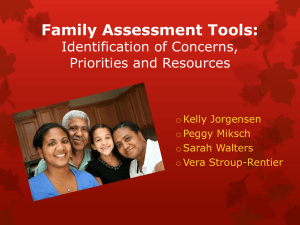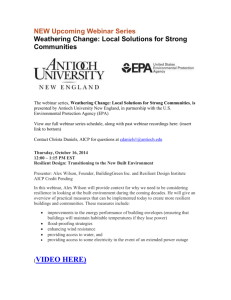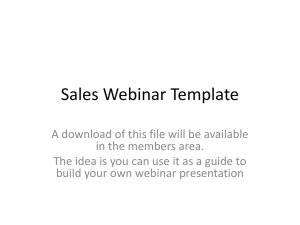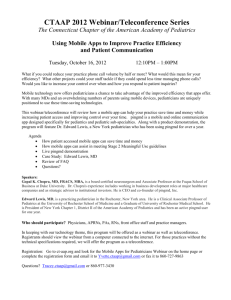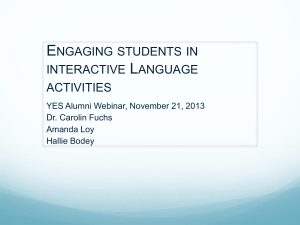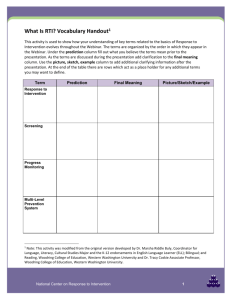2013 Medical Home in Pediatrics: The HOW TO Webinar Series
advertisement
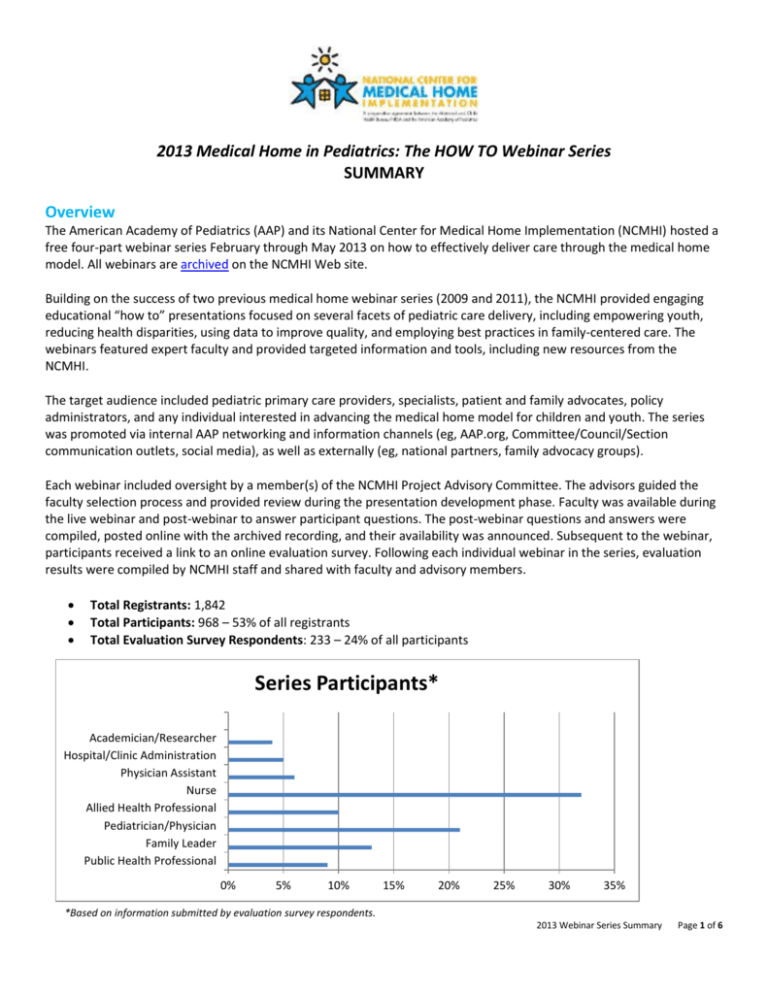
2013 Medical Home in Pediatrics: The HOW TO Webinar Series SUMMARY Overview The American Academy of Pediatrics (AAP) and its National Center for Medical Home Implementation (NCMHI) hosted a free four-part webinar series February through May 2013 on how to effectively deliver care through the medical home model. All webinars are archived on the NCMHI Web site. Building on the success of two previous medical home webinar series (2009 and 2011), the NCMHI provided engaging educational “how to” presentations focused on several facets of pediatric care delivery, including empowering youth, reducing health disparities, using data to improve quality, and employing best practices in family-centered care. The webinars featured expert faculty and provided targeted information and tools, including new resources from the NCMHI. The target audience included pediatric primary care providers, specialists, patient and family advocates, policy administrators, and any individual interested in advancing the medical home model for children and youth. The series was promoted via internal AAP networking and information channels (eg, AAP.org, Committee/Council/Section communication outlets, social media), as well as externally (eg, national partners, family advocacy groups). Each webinar included oversight by a member(s) of the NCMHI Project Advisory Committee. The advisors guided the faculty selection process and provided review during the presentation development phase. Faculty was available during the live webinar and post-webinar to answer participant questions. The post-webinar questions and answers were compiled, posted online with the archived recording, and their availability was announced. Subsequent to the webinar, participants received a link to an online evaluation survey. Following each individual webinar in the series, evaluation results were compiled by NCMHI staff and shared with faculty and advisory members. Total Registrants: 1,842 Total Participants: 968 – 53% of all registrants Total Evaluation Survey Respondents: 233 – 24% of all participants Series Participants* Academician/Researcher Hospital/Clinic Administration Physician Assistant Nurse Allied Health Professional Pediatrician/Physician Family Leader Public Health Professional 0% 5% 10% 15% 20% 25% 30% 35% *Based on information submitted by evaluation survey respondents. 2013 Webinar Series Summary Page 1 of 6 The Webinars How to Engage Youth in their Health Care February 27, 2013 Co-sponsored by Got Transition—the National Health Care Transition Center Faculty: Kitty O'Hare, MD, FAAP, Boston Children's Hospital's Martha Eliot Health Center; Justin Thompson; Teresa Nguyen Moderator: Carl Cooley, MD, FAAP Advisor: Carl Cooley, MD, FAAP Learning Objectives: Review the importance of empowering all youth in their health care using a strength-based approach Describe promising practices for pediatric providers to empower youth, especially during the process of transition from pediatric to adult care Describe the impact of empowerment on positive health outcomes and successful transition from pediatric to adult care Total Registrants: Live Participants: Evaluation Survey Respondents: 727 415 (57% of registrants) 85 (21% of participants) Disagree Neutral Strongly 2% 7% Disagree 2% Content provided via the webinar will assist me in improving my professional effectiveness. Strongly Agree 40% Agree 49% Evaluation survey respondents reported the following changes they planned to make as a result of their participation on the webinar: Our office will address putting together a binder for our special needs patients who are reaching transition ages, we will begin our transition process at a younger age. When creating presentations, or training modules about youth/young adults, I will ensure to involve them in the design and co-facilitation. Plan to remind parents that they need to start engaging their CSHCN child at a young age in their own care. Will be providing our patients with concise medical history to take with them as well as medical records. All start earlier giving more control to patients in managing their health care. I will manage my healthcare more effectively. 2013 Webinar Series Summary Page 2 of 6 How to Enhance Care Delivery for a Diverse Patient Population March 27, 2013 Co-sponsored by the National Center for Cultural Competence Faculty: Dwight Yoder, MD, FAAP, Pediatric Partners of Mobile AL; Diane Dooley, MHS, MD, FAAP, Contra Costa Regional Medical Center Moderator: Colleen Kraft, MD, FAAP, Associate Professor of Pediatrics, Virginia Tech Carilion School of Medicine and Research Institute Advisors: Colleen Kraft, MD, FAAP and William Schwab, MD Learning Objectives: Review the importance of effective provision of comprehensive care for patients and families who are vulnerable and/or medically underserved Explore specific strategies to deliver pediatric care in a culturally competent manner Highlight practical tools that can be used to assess patient and family needs in a culturally competent manner Total Registrants: Live Participants: Evaluation Survey Respondents: 286 154 (54% of registrants) 44 (29% of participants) Content provided via the webinar will assist me in improving my professional effectiveness. Neutral 29% Disagree 5% Strongly Disagree 0% Strongly Agree 27% Agree 39% Evaluation survey respondents reported the following changes they planned to make as a result of their participation on the webinar: It helped me better understand other cultures, how I will communicate with them, assist them to find resources etc. It will help open dialogues with my pediatric partners. It will allow me to be more culturally sensitive to the needs of my patients. It reinforced behaviors and/or tools I can use for the community health advocacy parts of my job. I got some ideas for policy development. 2013 Webinar Series Summary Page 3 of 6 How to Use Data to Improve Care Delivery April 25, 2013 Co-sponsored by the Child and Adolescent Health Measurement Initiative Faculty: Christy Bethell, PhD, MPH, MBA, Director, The Child and Adolescent Health Measurement Initiative; RJ Gillespie, MP, MHPE, FAAP, Medical Director for the Oregon Pediatric Improvement Partnership Moderator: Linda Lindeke, PhD, RN, CNP Advisors: Linda Lindeke, PhD, RN, CNP and Wendy Looman Learning Objectives: Review the updated state profiles and additional resources on the Medical Home Data Portal Illustrate the practical use of state-level data sets to improve care equity, access, and quality for children and families Explain how to effectively work with state-level data to advance the medical home model Total Registrants: Live Participants: Evaluation Survey Respondents: 314 177 (56% of registrants) 43 (24% of participants) Disagree 2% Strongly Disagree 2% Content provided via the webinar will assist me in improving my Neutral professional effectiveness. 3% Strongly Agree 22% Agree 71% Evaluation survey respondents reported the following changes they planned to make as a result of their participation on the webinar: I am planning to share information with local pediatricians who work with CYSHCN. Listen more intently to what the patient needs so that the provider can adequately meet their needs; not just perfect scores. I learned concepts to focus on when measuring data. I will look into medical data portal and start using it. It will help us to build our training piece for care coordination and ability to support our efforts through our data. 2013 Webinar Series Summary Page 4 of 6 How to Incorporate Best Practices in Family-Centered Care in Your Practice May 29, 2013 Faculty: Rebecca A. Malouin, PhD, MPH, Michigan State University; Javier Aceves, MD, FAAP, Young Children's Health Center, Albuquerque, NM; Joseph Pringle, Jr., MD, FAAP; Shannon Huffman, Family Centered Health Navigator; Debbi Kennerson-Webb, MA, LPA, North Carolina Project Launch Moderator: Lee Partridge, National Partnership for Women and Families Advisors: Lee Partridge and Christopher Stille, MD, FAAP Learning Objectives: Explain the definition and importance of family-centered care in a pediatric care setting Explore case studies that represent the broad spectrum of family-centered care implementation in practice Highlight practical tools that practices can use to better partner with families in their delivery of care Total Registrants: Live Participants: Evaluation Survey Respondents: 515 222 (43% of registrants) 61 (28% of participants) Content provided via the webinar will assist me in improving my professional effectiveness. Strongly Disagree 2% Disagree 0% Neutral 12% Strongly Agree 24% Agree 62% Evaluation survey respondents reported the following changes they planned to make as a result of their participation on the webinar: This helped me have ideas to share with clinics as a state public health professional. Changing the name of our patient services coordinator to Family Services Navigator! Also, will recruit parents of children without chronic disease to our parent advisory group. Add patient/parent partner to our PCMH practices. I will use the information to assist as we train families on patient-centered care. Include the family in the problem solving/plan of action vs. having them listen as we talk. Use content to assist in preparation of scholarly presentations and publications. 2013 Webinar Series Summary Page 5 of 6 Recommendations and Suggestions for Improvement The facilitation of this webinar series provided an opportunity to learn from participants on how to improve upon the educational offerings in the future, whether they are process-related or content-related enhancements. The following are key recommendations based on both staff and participant feedback for future webinar series organized by the NCMHI: Process Recommendations: Send slide presentation to participants before the live event Test-runs with faculty and advisors are critical to the ease of facilitating the live event Staff should retain control of the slide advancement during live event Ensuring at least 15 minutes of time at the end of each webinar for participant questions is essential Following up with participants to answer their questions post-webinar and then collecting all Q&A to be archived on the site with the recording is a valuable resource Integrate questions about registrants during the registration process (eg, their professional designation and affiliation), rather than during the evaluation survey Brainstorm creative ways to elicit a higher participant evaluation response rate Integrate a question in the evaluation regarding whether respondents are interested in making themselves available as a possible presenter in future educational events Ask faculty and advisors to be mindful of the presentation content and make sure language is clear to those participants who may not necessarily be part of the public health industry Youth/parent/patient voice very well-received; integrate in future webinars as much as possible Encourage advisors to help faculty include case studies that are relevant to and replicable in a variety of community and care settings Integrate quality improvement (measurement tools, specific metrics) and payment strategies into the content as much as possible to ensure discussion of cost-effectiveness and evidence-base of medical home implementation strategies Investigate capacity for webinar software to accommodate videos and other special features to enhance the presentation for participants and to keep their attention Requested Topics for Future Webinars: Integrating behavioral health and physical health Motivational interviewing Expectations of parent participation and partnership in the medical home model How to work with community organizations to improve access to medical homes Impact of Affordable Care Act on medical home implementation Information on how state and local health departments provide resources and assistance to families and practices for medical home implementation Access to care in frontier states, as well as rural communities How to integrate support staff protocols (ie, how to use practice staff to the highest level) Next Steps The collected evaluation data and set of recommendations will serve as a foundation for future annual webinar series planned by the National Center for Medical Home Implementation in subsequent years. This summary can be used by advisory committee members and staff to help ensure future webinars will meet the needs of target audiences. 2013 Webinar Series Summary Page 6 of 6
